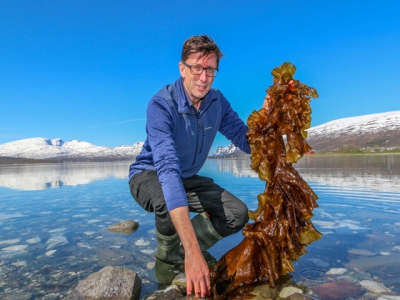Low trophic aquaculture in the spotlight in new EU funded project

This week, over 70 scientists and industry professionals from 16 countries gather in Tromsø, Norway to launch the EU funded AquaVitae project.
Philip James from New Zealand coordinates AquaVitae, an €8 million EU funded low-trophic aquaculture project. Here holding an example of macroalgae in Tromsø, Norway. Macroalgae is one of the five value chains to be addressed in the project. Photo by © AquaVitae
Over the next four years, they will work to increase aquaculture production of low-trophic species, in and around the Atlantic Ocean, in sustainable ways.
AquaVitae is a new research and innovation project funded by the EU’s Horizon 2020 programme. The project consortium consists of 36 partners, from 16 different countries, spread across four continents. In addition to Europe, partners are situated in countries bordering the Atlantic Ocean, including Brazil, South Africa, Namibia, as well as in North America.
“It’s an exciting challenge to bring together industry and research partners from across the length and breadth of the Atlantic to address relevant societal challenges,” says project coordinator Philip James.
James is a senior scientist at Nofima – the Norwegian Institute of Food, Fisheries and Aquaculture Research. With a total budget of €8 million, this is the second largest EU project ever coordinated by Nofima.
Aquaculture value chains
The project’s purpose is to introduce new low trophic species, products and processes in marine aquaculture value chains across the Atlantic. The five chosen value chains include macroalgae, Integrated Multi-Trophic Aquaculture (IMTA), echinoderm species (e.g. sea urchins), shellfish and finfish. IMTA is a process that farms several species together using waste from one species as feed for another.
“The value chains were selected because of their promising contributions to sustainable food and feed production. There is a lot of potential in these value chains and we wish to discover new ways to improve them,” says James.
This correlates with recommendations made in the Food from the Oceans report (2017), which highlighted the need to expand low- and multi-trophic marine aquaculture as an ecologically efficient source of increasing food and feed.
Cross-cutting activities
To complete the objectives, 11 case studies will be conducted across the Atlantic, with emphasis on developing new products from low-trophic species (e.g. macroalgae and sea urchins), optimising production in existing industries (e.g. shellfish and finfish) and moving towards zero waste and a circular economy in aquaculture (e.g. IMTA and Biofloc).
Some of the cross-cutting activities involve research into biosensors, Internet of Things (IoT), product characteristics, market potential, sustainability, environmental monitoring, as well as conducting risk assessments, analyses of value chains, studying profitability and the legal framework.
Furthermore, the project will implement a multi-actor approach to ensure stakeholder involvement in all phases of the project. Industry actors serve as partners in the consortium alongside research institutes and universities, which will also help to establish a durable aquaculture industry and research network around the Atlantic Ocean.
Có thể bạn quan tâm
 Vietnam in urgent need of brands for tra fish
Vietnam in urgent need of brands for tra fish Vietnam is facing an urgent need to build brands for its tra fish, a big foreign currency earner, amidst numerous challenges facing the industry.
 Prices of tra fish plunge, breeders suffer huge losses
Prices of tra fish plunge, breeders suffer huge losses The prices of tra fish have plummeted since the beginning of the year with tra fish breeders facing heavy losses from low prices.
 Seafood industry needs new strategy to benefit from trade pacts
Seafood industry needs new strategy to benefit from trade pacts The seafood industry must envision a long-term strategy to make full use of new trade pacts and prepare for problems that might arise when they take effect